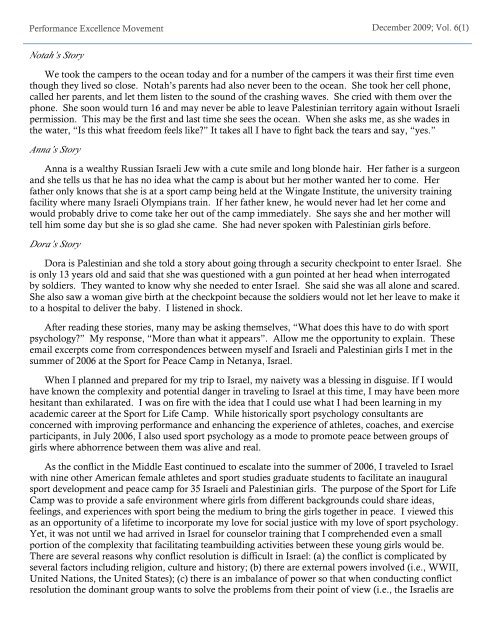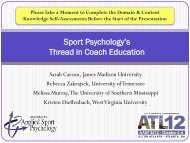Performance Excellence Movement - Association for Applied Sport ...
Performance Excellence Movement - Association for Applied Sport ...
Performance Excellence Movement - Association for Applied Sport ...
You also want an ePaper? Increase the reach of your titles
YUMPU automatically turns print PDFs into web optimized ePapers that Google loves.
<strong>Per<strong>for</strong>mance</strong> <strong>Excellence</strong> <strong>Movement</strong><br />
Notah’s Story<br />
December 2009; Vol. 6(1)<br />
We took the campers to the ocean today and <strong>for</strong> a number of the campers it was their first time even<br />
though they lived so close. Notah’s parents had also never been to the ocean. She took her cell phone,<br />
called her parents, and let them listen to the sound of the crashing waves. She cried with them over the<br />
phone. She soon would turn 16 and may never be able to leave Palestinian territory again without Israeli<br />
permission. This may be the first and last time she sees the ocean. When she asks me, as she wades in<br />
the water, “Is this what freedom feels like?” It takes all I have to fight back the tears and say, “yes.”<br />
Anna’s Story<br />
Anna is a wealthy Russian Israeli Jew with a cute smile and long blonde hair. Her father is a surgeon<br />
and she tells us that he has no idea what the camp is about but her mother wanted her to come. Her<br />
father only knows that she is at a sport camp being held at the Wingate Institute, the university training<br />
facility where many Israeli Olympians train. If her father knew, he would never had let her come and<br />
would probably drive to come take her out of the camp immediately. She says she and her mother will<br />
tell him some day but she is so glad she came. She had never spoken with Palestinian girls be<strong>for</strong>e.<br />
Dora’s Story<br />
Dora is Palestinian and she told a story about going through a security checkpoint to enter Israel. She<br />
is only 13 years old and said that she was questioned with a gun pointed at her head when interrogated<br />
by soldiers. They wanted to know why she needed to enter Israel. She said she was all alone and scared.<br />
She also saw a woman give birth at the checkpoint because the soldiers would not let her leave to make it<br />
to a hospital to deliver the baby. I listened in shock.<br />
After reading these stories, many may be asking themselves, “What does this have to do with sport<br />
psychology?” My response, “More than what it appears”. Allow me the opportunity to explain. These<br />
email excerpts come from correspondences between myself and Israeli and Palestinian girls I met in the<br />
summer of 2006 at the <strong>Sport</strong> <strong>for</strong> Peace Camp in Netanya, Israel.<br />
When I planned and prepared <strong>for</strong> my trip to Israel, my naivety was a blessing in disguise. If I would<br />
have known the complexity and potential danger in traveling to Israel at this time, I may have been more<br />
hesitant than exhilarated. I was on fire with the idea that I could use what I had been learning in my<br />
academic career at the <strong>Sport</strong> <strong>for</strong> Life Camp. While historically sport psychology consultants are<br />
concerned with improving per<strong>for</strong>mance and enhancing the experience of athletes, coaches, and exercise<br />
participants, in July 2006, I also used sport psychology as a mode to promote peace between groups of<br />
girls where abhorrence between them was alive and real.<br />
As the conflict in the Middle East continued to escalate into the summer of 2006, I traveled to Israel<br />
with nine other American female athletes and sport studies graduate students to facilitate an inaugural<br />
sport development and peace camp <strong>for</strong> 35 Israeli and Palestinian girls. The purpose of the <strong>Sport</strong> <strong>for</strong> Life<br />
Camp was to provide a safe environment where girls from different backgrounds could share ideas,<br />
feelings, and experiences with sport being the medium to bring the girls together in peace. I viewed this<br />
as an opportunity of a lifetime to incorporate my love <strong>for</strong> social justice with my love of sport psychology.<br />
Yet, it was not until we had arrived in Israel <strong>for</strong> counselor training that I comprehended even a small<br />
portion of the complexity that facilitating teambuilding activities between these young girls would be.<br />
There are several reasons why conflict resolution is difficult in Israel: (a) the conflict is complicated by<br />
several factors including religion, culture and history; (b) there are external powers involved (i.e., WWII,<br />
United Nations, the United States); (c) there is an imbalance of power so that when conducting conflict<br />
resolution the dominant group wants to solve the problems from their point of view (i.e., the Israelis are<br />
10






